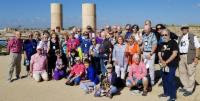oil spill in the Gulf of Mexico, this blog has gone on to address very personal concerns, as well as issues impacting the wider world. Racism, sexism, homophobia, war and peace, gun violence, climate change, and so many other issues. All the result of this pastor's ponderings on Periwinkle Way. And other places as well--California, Israel, Trinidad, all over New England, Chicago and during the pandemic lockdown, at home!
But this coming Sunday, April 24, I will conduct my last service as Senior Pastor of the Sanibel Congregational United Church of Christ, which has its facilities on Periwinkle Way. 2050 Periwinkle Way to be specific. And then I will retire. While my wife Linda and I will remain here in Southwest Florida, my ponderings will not be taking place on Periwinkle Way. So this blog, will come to an end with this post.
They say once on the internet, always on the internet. So the blog will remain on line. But there will be no new entries. I do anticipate starting a new blog once the dust of retirement settles. There will be ponderings in other places. And if you want to be notified when that happens, please feel free to leave a contact e-mail in the comments section of this blog, or e-mail me at the church over the next few days.
I have been very grateful for the continued interest in these writings and your loyalty as readers. As you continue in your own ponderings, might you be blessed with insight and clarity.
(And if you are in the area, I'd love to greet you in person at that final service which will be held at 10:30 AM, Sunday, April 24, at the church.)
















